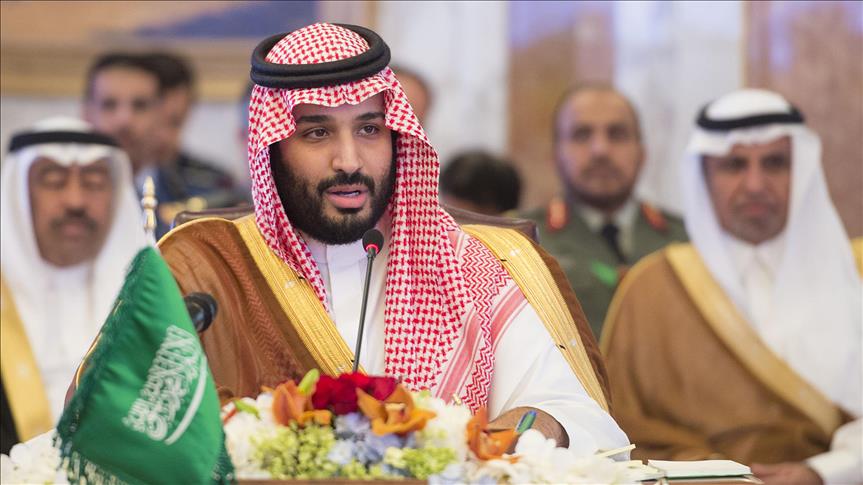'Fresh prince of Riyadh' tightens grip on Saudi economy
Deputy Crown Prince Mohammed bin Salman's control demonstrated with removal of oil minister, analysts say

New York
By Ovunc Kutlu
NEW YORK
A recent governmental reshuffle in Saudi Arabia has seen Deputy Crown Prince Mohammed bin Salman consolidate his grip on the kingdom, analysts said Wednesday.
The 31-year-old prince is seen as the upcoming power in the oil-rich nation and the favorite of his father, King Salman bin Abdulaziz Al Saud.
“Deputy Crown Prince Mohammed bin Salman is currently pulling all the strings,” Cyril Widdershoven, senior vice president at MEA Risks. “It seems that he has been able to gain all support within the ruling family and the royal court.
“At present, his role is growing by leading the new strategies and political ideas of Saudi Arabia. Without any doubt, he will be the main power factor in Saudi Arabia, and possibly in the GCC [Gulf Cooperation Council] region, for the next decades.”
Over the weekend, a change of ministers saw long-serving Oil Minister Ali al-Naimi replaced as well as the ministers of commerce and industry, social affairs, health, transport and the Hajj.
Under King Salman, Prince Mohammed has been overseeing Saudi economic policy amid plans for wide-ranging reforms as lower oil prices have depleted state revenues.
“Mohammed Bin Salman is keen to show he is the fresh prince of Riyadh,” Sijbren de Jong, a strategic analyst at The Hague Centre for Strategic Studies, said.
“He is the man who holds much power in the kingdom.”
The prince, who became the world's youngest defense minister in January last year, recently outlined the ambitious Vision 2030 plan. Under the scheme, some shares in Saudi Aramco, the world’s largest oil company, will be offered for sale to generate revenues for a planned $2 trillion sovereign wealth fund.
The strategy is aimed at cutting the kingdom’s dependence on oil revenues, which constitute around 80 percent of government income.
“Mohammed bin Salman's plans are very well thought off,” Widdershoven said. “However, he is presenting a radical change of a conservative society while setting himself official deadlines which are not really able to be met.
“Changes are needed. Saudis will need to diversify their economy to get into the 21st century. But changes will take longer as the infrastructure and political will are not yet fully there.”
- Unrealistic plan
De Jong added: “Vision 2030 lacks a lot of realism and the proposed timeline is far too ambitious. His approach is likely to create many enemies within the kingdom.”
Prince Mohammed’s power was demonstrated last month when he blocked attempts by other oil-producing nations to freeze oil production levels.
At a meeting in Qatar, al-Naimi resisted pressure on Saudi Arabia and OPEC to cut production in order to increase prices. However, he was willing to listen to proposals until the prince stepped in, refusing to freeze Saudi oil production unless regional rival Iran did the same.
The failure to reach a deal shocked the global oil market. It was followed on Saturday by the removal of al-Naimi from a post he had held for 21 years. He was replaced by Aramco Chairman Khalid al-Falih.
“Al-Naimi’s removal will be presenting Saudi Arabia and the international oil markets with several challenges,” Widdershoven said.
“He has always been regarded as a very astute leader, trying to bring stability into the oil market. With his enormous network, he was able to deal with geopolitical and market challenges without real problems.”
Following his appointment, al-Falih announced Saudi Arabia would continue to maintain its role in supplying the demands of the global energy market - maintaining oil output and protecting its market share.
Widdershoven said al-Falih would need to reestablish relations in Asia and among non-OPEC states and consumer countries.
“Trimming oil production is out of question for Saudi Arabia,” he said. “No real production changes are to be expected by OPEC, especially not if non-OPEC and Iran are going to comply. Al-Falih will continue al-Naimi’s strategy for sure. He won't be able to change it in a year.”
De Jong said a reduction in oil output would be unlikely. “As long as there is a lack of non-OPEC and Iran commitment, [an output cut] will definitely not happen,” he said. “Saudi dominance within OPEC won't be challenged either.”
Widdershoven emphasized al-Falih’s reliance on Prince Mohammed. “As long as the latter is supporting him, stability will continue.”
Anadolu Agency website contains only a portion of the news stories offered to subscribers in the AA News Broadcasting System (HAS), and in summarized form. Please contact us for subscription options.







